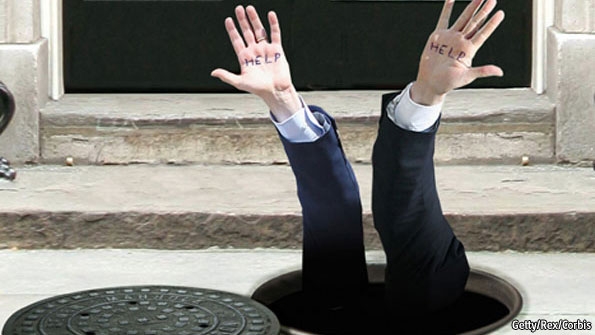 本周,英国的政治家们从“沙滩排球”中抽空去干了件真正愚蠢的事。首相大卫•卡梅伦(保守党党魁),以及副首相尼克•克莱格(自由民主党领袖),有效灭杀了2次有益的宪政改革。这样做,不仅削弱了政府力量,而且极大得损害了两党的政治前景。如果在下届选举中他们失权,那毫无疑问,保守党们会疑惑在2012年夏季的这次选举中他们是如何获胜的。
本周,英国的政治家们从“沙滩排球”中抽空去干了件真正愚蠢的事。首相大卫•卡梅伦(保守党党魁),以及副首相尼克•克莱格(自由民主党领袖),有效灭杀了2次有益的宪政改革。这样做,不仅削弱了政府力量,而且极大得损害了两党的政治前景。如果在下届选举中他们失权,那毫无疑问,保守党们会疑惑在2012年夏季的这次选举中他们是如何获胜的。
事情的起点是政府的一项议案,该议案将缩减上议院的规模,并规定其大部分成员需由选举产生。自由民主党非常热衷于此次改革。许多保守党议员厌恶它,部分原因是因为自由民主党如此热情,另一原因是他们怀疑这个由选举产生的上议院可能会威胁到下议院的首脑地位。五月,许多保守党后座议员,包括一些平时不发表言论的议员,都投了这个议案的反对票。首相卡梅伦做出了让步,因为上议院是不可能赢过下议院的。
克莱格先生立即跺脚宣称此次上议院改革的失败违背了2010年签署的联盟协议。因此他有权反对另一项改革——选区分界。该革新可确保所有选区的选民数量大致相同,并将把原来650名议员缩减至600名。根据选举数学,此改革方案对自由民主党的危害是最大的。
因此,各种借口,各种托词纷纭四起。但是以长远的眼光看,这场口水战在三个不同的层面上是极具破坏力的。一,无法进行完整的政宪改革是可悲的。上议院应该由选举产生:这种让政治官员掌控立法权,且放任世袭制度的形势是很荒谬的。同样地,改良选区分界能够反映人口的变化,创造一个更值得依赖、更平民式的下议院。全国各地的选民数量应该是一致的。的确,相比上议院改组或选区分界的改变,英国公众有更值得担忧的事情。但是,这两项改革还是普遍有用的。
二,现在的政府联盟远比我们想象的薄弱。通过平息各自党中的叛乱,卡梅伦和克莱格在政府中安下了一个更大的炸弹。曾经,两党因“兴趣相投”而结合在一起,包括教育改革,地方主义和偿清赤字这些协议。而如今,恐怕是担心一旦两党解体所产生的后果:保守党在民意调查中落后于工党,而自由民主党生死未定,不断挣扎。本周也许将是协议土崩瓦解的起点。克莱格通过把联合协议描述成纯粹的合同事宜,开创了针锋相对的政治活动的新时代。联合计划与其说是一场婚姻,不如说是一盘由脾气暴躁的棋手下的象棋游戏。这不符合英国的利益。
干得漂亮:你拯救了上议院,但也败选了
三,关于保守党党员——削弱了他们选举的希望。提议对选区分界的改变,目的在于纠正在选举系统中存在的强烈偏见:偏爱工党。1992年,约翰•梅杰赢得保守党议会大多数(仅21)选票,领先7.5分。相比之下,2005年,托尼•布莱尔赢得大多数选票65票,只领先保守党2.8分。而设于2015年的下届选票,选票分区的变革将会为保守党带来12——20的赞成票,而目前保守党离绝对多数还缺21票。随着保守党几乎所有党员都被驱逐出苏格兰和一些大城市,工党已经占有了强有力的防守地位。现在,工党胜利或将与自由民主党共同执政的可能性增加了。
反对上议院重组的保守党叛军知道他们的搭档会以牙还牙。如果下一届选票之后他们醒悟,发现是工党在权或工党与自由民主党联合执政,而他们保守党将面临为期五年的反对党地位,那那些保守党党员也许会重新考虑保持上议院的不民主化是否真的是一个伟大的政治决策。同时,他们使执政变得更加艰难。干得好啊,蠢货们。
The past week could prove a disastrous one in British politics—especially for David Cameron
BRITAIN’S politicians took a break from the beach volleyball this week to do something truly silly. David Cameron, the Conservative prime minister, and Nick Clegg, his Liberal Democrat deputy, in effect killed off two beneficial constitutional reforms. In doing so, the pair weakened the government and greatly harmed both their parties’ political prospects. If they lose power at the next election, the Tories could well wonder what possessed them in the summer of 2012.
The starting point was a government bill that would have made the House of Lords smaller and largely elected. Liberal Democrats are keen on this reform. Many Conservative MPs loathe it, partly because the Lib Dems are so enthusiastic, partly because they suspect an elected Lords would challenge the primacy of the House of Commons. In May many Tory backbenchers, including some who are generally placid, rebelled by voting against the bill. Concluding that it is impossible to win them over, the prime minister has backed down.
Mr Clegg promptly stamped his foot, declaring that the failure of Lords reform represented a breaking of the coalition agreement signed in 2010. He was therefore free to oppose another reform, to electoral boundaries. This would have ensured that all constituencies contained about the same number of voters and would have trimmed the number of MPs from 650 to 600. Thanks to electoral maths, it would probably have hurt the Liberal Democrats most.
So there are excuses and pretexts. But in the long term this spat could prove deeply destructive on three different levels. First, it is sad that constitutional reform has been curtailed. The House of Lords should be elected: it is absurd to have political placemen shaping the laws of the land, let alone people who owe their seats to their family tree. It is likewise right to reshape constituency boundaries to reflect population changes and to create a leaner and cheaper Commons. Votes should count the same across the land. True, the British public has more to worry about than either Lords reform or boundary changes. But the reforms were still broadly useful.
Second, the coalition is now far weaker. By trying to defuse rebellions in their own parties, the Conservative and Liberal Democrat leaders have primed a much bigger bomb under the government. The coalition was once bound together by affinity, with the two parties discovering they agreed on a good deal, including school reform, localism and paying off the deficit. It is now held together more by a fear of what would happen if it dissolved: the Tories trail Labour in the polls, and the Liberal Democrats are floundering. This week may come to be seen as the point at which their pact began to fall apart. By describing the coalition agreement as a purely contractual affair, Mr Clegg inaugurated a new era of tit-for-tat politicking. The project looks less like a marriage and more like a bad-tempered game of chess. That is not in Britain’s interests.
Well done: you saved the Lords and lost the election
The third level concerns the Conservatives—and the damage to their election hopes. The proposed changes to constituency boundaries were intended to correct a strong bias in the electoral system in favour of the Labour Party. In 1992 John Major won a Conservative parliamentary majority of just 21 with a lead of 7.5 points. In 2005, by contrast, Tony Blair achieved a majority of 65 with a lead of just 2.8 points over the Tories. At the next election, set for 2015, boundary reform is thought to be worth between 12 and 20 seats to the Conservatives, who are currently 21 short of an absolute majority. With the Tories all but driven out of Scotland and the big cities, Labour already had a strong defensive position. Now the odds of Labour winning, or sharing power with the Lib Dems, have increased.
The Tory rebels who voted against Lords reform knew their partners would retaliate. If they wake up after the next election to discover Labour in power or in talks with the Lib Dems, and their own party facing five years in opposition, those Tories might reconsider whether keeping an undemocratic Lords was such a great political prize. In the meantime they have made governing harder. Nice work, folks.
 本周,英国的政治家们从“沙滩排球”中抽空去干了件真正愚蠢的事。首相大卫•卡梅伦(保守党党魁),以及副首相尼克•克莱格(自由民主党领袖),有效灭杀了2次有益的宪政改革。这样做,不仅削弱了政府力量,而且极大得损害了两党的政治前景。如果在下届选举中他们失权,那毫无疑问,保守党们会疑惑在2012年夏季的这次选举中他们是如何获胜的。
本周,英国的政治家们从“沙滩排球”中抽空去干了件真正愚蠢的事。首相大卫•卡梅伦(保守党党魁),以及副首相尼克•克莱格(自由民主党领袖),有效灭杀了2次有益的宪政改革。这样做,不仅削弱了政府力量,而且极大得损害了两党的政治前景。如果在下届选举中他们失权,那毫无疑问,保守党们会疑惑在2012年夏季的这次选举中他们是如何获胜的。
